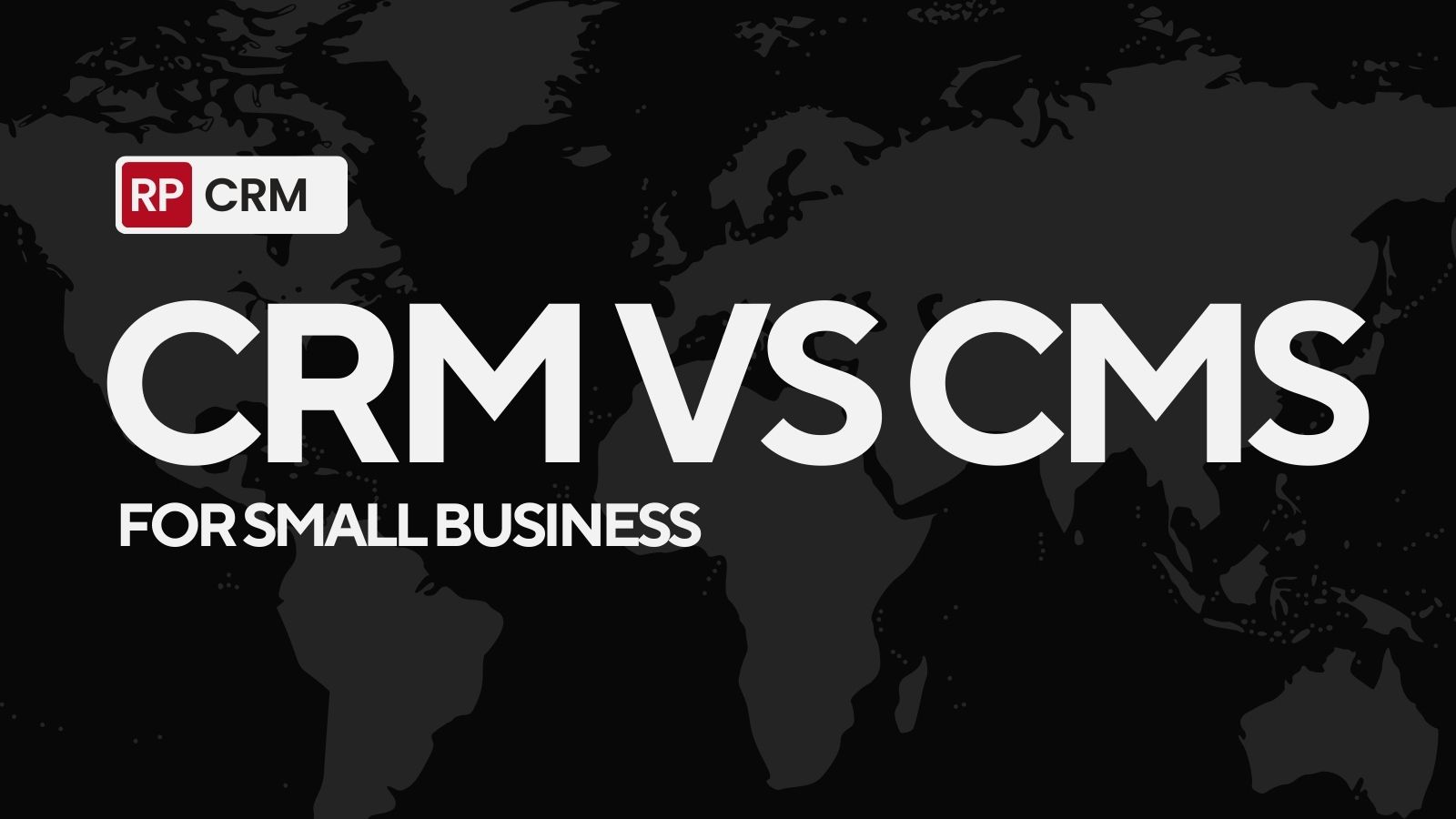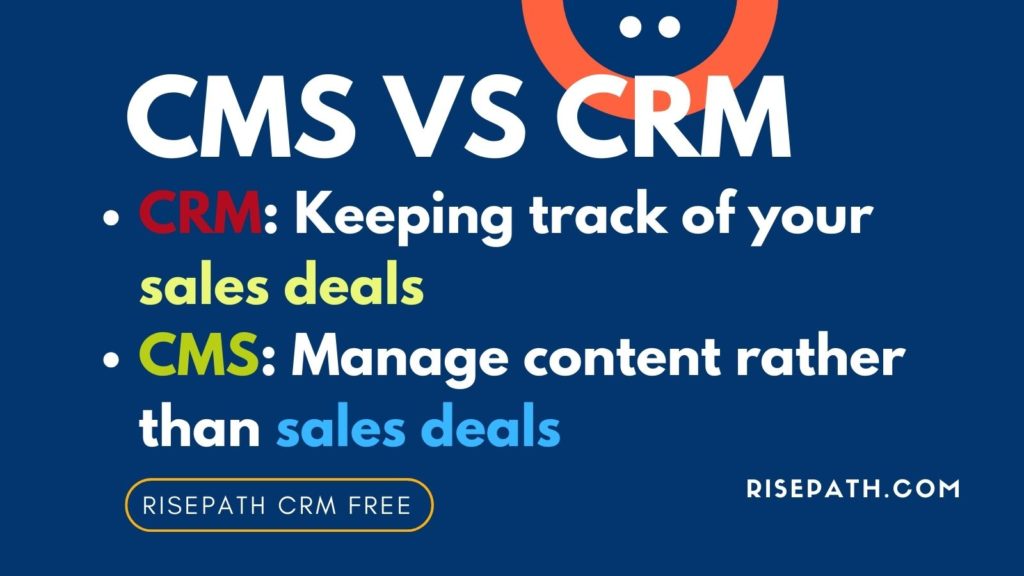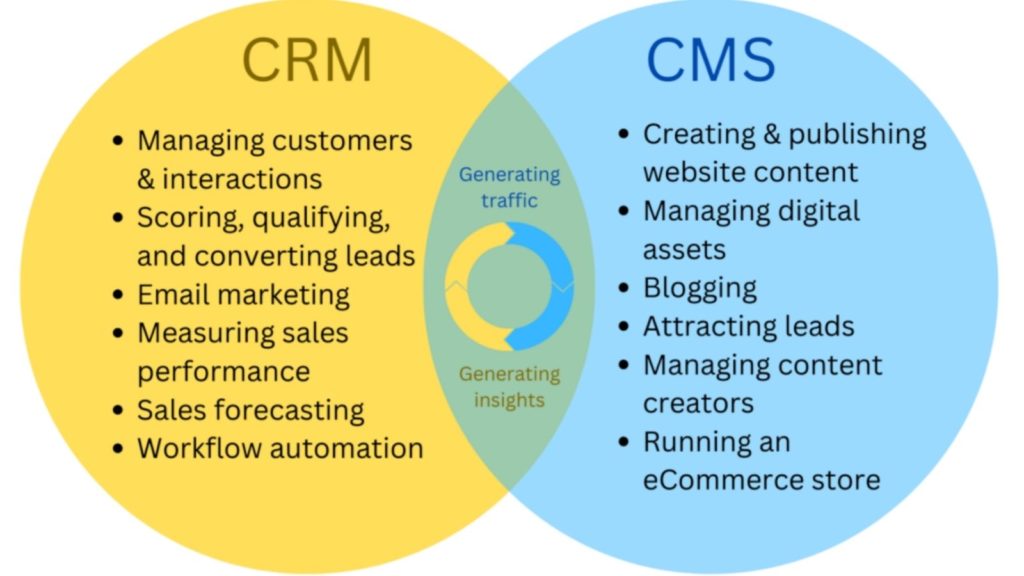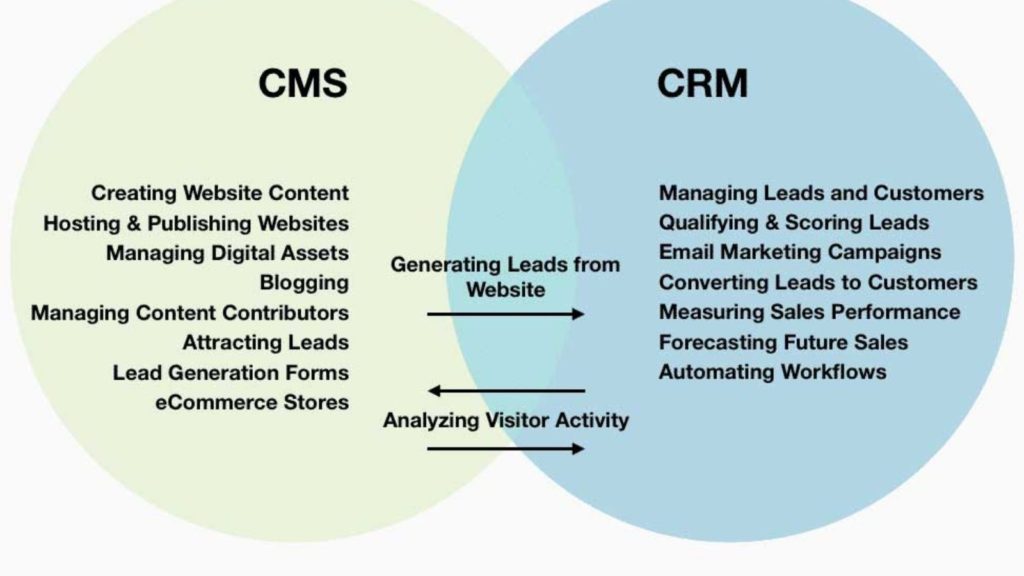Customer Relationship Management (CRM) software has become an increasingly important tool for businesses, allowing them to store customer data and track customer interactions. CRM software enables businesses to analyse customer data and behaviour, allowing them to tailor their services and marketing strategies to meet customer needs. On the other hand, Content Management System (CMS) software is used to create, manage, and publish content across multiple platforms. CMS helps businesses to create, manage, and publish content, such as webpages, blogs, and social media posts.
The difference between CRM and CMS is that CRM focuses on managing relationships and interactions with customers, while CMS focuses on publishing content. As such, CRM is best suited for businesses that need to track customer data and interactions, while CMS is better suited for businesses that need to create and manage content.
Both CRM and CMS are important tools for businesses and the choice of which one to use depends on the specific needs of the business. It is important to understand the differences between CRM and CMS and how they can be used to improve customer service and marketing strategies. With the right tools, businesses can ensure they are providing the best possible customer service and reaching their target audience with the right content.
What is a CRM?
Customer Relationship Management (CRM) is a powerful tool used by many businesses to manage customer data, customer interactions and improve customer relations. With CRM software, organisations can store customer data, create comprehensive reports, and track customer interactions, giving them an insight into customer behaviour and preferences. This allows them to develop better strategies for customer engagement and segment customers into specific groups, enabling tailored messages to be sent out.
CRM software can also automate processes such as sales, marketing, customer service and customer retention. It can also be used to track sales opportunities, manage customer relationships, and analyse customer data. This is in contrast to a Content Management System (CMS), which is used to create, manage and publish digital content, such as websites and blogs.
CRM software provides businesses with a great way to manage customer data and customer interactions, giving them a better understanding of their customers. This can help them to develop better strategies for customer engagement, as well as giving them the ability to automate processes, and track sales opportunities. It is an essential tool for any business looking to improve their customer relations.
What is a CMS?
A CMS (Content Management System) is a platform used to manage the content of a website. It allows users to create, modify and publish content such as text, images, audio and video, as well as manage multiple users and control access levels. It also provides a user-friendly interface, making it easier for non-technical users to manage their websites.
A CMS helps to organise content into categories and sub-categories, making it easier to search and access, while also storing content in a database, making it easier to manage and update content over time. This makes it a great choice for businesses looking for an efficient way to manage their website content.
Also Read: From Social Media to Your CRM
CRM (Customer Relationship Management) is a platform used to manage customer data and interactions. It helps businesses to track customer information, interactions, and trends. It also allows businesses to manage customer relationships by providing them with the tools to segment and target customers based on their behaviour.
Both CMS and CRM are powerful tools for businesses. CMS is the ideal choice for managing website content, while CRM is the perfect option for managing customer data and relationships. Choosing the right platform for your business will depend on your needs and goals.
What are the biggest differences between a CRM and a CMS?
When it comes to managing customer data and interactions, a CRM (Customer Relationship Management) system is essential. It is used to track customer information, generate reports, and manage customer relationships and interactions such as sales, marketing, and customer service. On the other hand, a CMS (Content Management System) focuses on managing website content such as text, images, and videos. It is used to create and manage websites, as well as online forms.
Also Read: The Ultimate Comparison: ERP vs CRM, CRM vs CMS, ATS vs CRM, and CRM vs SRM – Which Solution is Right for Your Business?
A CRM is primarily used for sales and customer service while a CMS is used for content creation and management. Both systems are invaluable tools for any business, as they provide the necessary data and content to help a company reach its goals. Therefore, it is important to understand the differences between a CRM and a CMS in order to properly utilize both systems.
Key CRM and CMS Features
The debate between Customer Relationship Management (CRM) and Content Management Systems (CMS) is an ongoing one in the digital marketing world. While both systems are beneficial for businesses, they offer different functions and have distinct advantages and disadvantages.
CRM is designed to help businesses increase customer satisfaction by automating the sales pipeline, lead generation and customer segmentation, contact management, opportunity tracking, reporting and analytics, customer data management, and collaboration tools. It also includes customizable dashboards, relevant notifications, automated email campaigns, and mobile CRM access, allowing businesses to build and maintain strong relationships with their customers.
CMS, on the other hand, is a system that helps businesses manage their online content, such as webpages, blogs, and other digital media. It allows businesses to create, edit, and publish content quickly and easily, while also allowing for customization and personalization of the content. CMS also helps businesses to keep track of their content, providing analytics, tracking, and reporting tools to help businesses better understand their customers.
Ultimately, both CRM and CMS are invaluable tools for businesses looking to optimize their digital presence and increase customer satisfaction. While they offer different functions, they are both essential for businesses serious about engaging and retaining their customers.
1- Contact Management Tools
Customer Relationship Management (CRM) and Content Management Systems (CMS) are two of the most important tools for businesses today. While the two share similar capabilities, they are two distinct tools that can be used to improve customer experience and maximize profits.
CRM is a contact management tool that allows businesses to store and manage customer data such as contact information, preferences, and purchase history. With CRM, businesses can efficiently organize and sync contacts with other systems, such as email marketing, sales, and customer service. It allows businesses to quickly access customer information and notes, making customer communication more efficient and effective. Furthermore, CRM can be used to track customer interactions and gain insights into customer behaviour.
CMS, on the other hand, is a tool that helps businesses create and manage content. It enables businesses to create, edit, and publish web content, such as blog posts, articles, and product pages. CMS also allows businesses to design, develop, and manage webpages and websites. Additionally, it provides tools to help businesses track and analyse website performance, allowing them to optimise content for better user experience.
Both CRM and CMS are essential for businesses today. While the two share similar capabilities, they are two distinct tools that can be used to improve customer experience and maximize profits. With CRM, businesses can efficiently manage their customer data and gain insights into customer behaviour. And with CMS, businesses can create, manage, and analyse web content to optimise user experience.
2 – Automated Data Capture
When it comes to customer relationship management (CRM) and content management systems (CMS), automated data capture is an essential process which can help to streamline operations and provide better customer experiences. Automated data capture eliminates the need for manual data entry, reducing the time and cost associated with it, and helps to improve data accuracy by automatically detecting errors and filling in missing data.
By providing quick and accurate answers to customer queries, automated data capture helps to improve customer experience. It also helps to improve customer segmentation and personalization by providing accurate data about customers, enabling CRM and CMS systems to create better customer profiles. This in turn can improve sales and marketing efforts, allowing businesses to better target potential customers and increase conversions.
In short, automated data capture is a valuable process which can help businesses to improve their CRM and CMS systems, providing them with the data they need to better understand and engage with their customers.
3 – Deal Tracking
When it comes to keeping track of your sales deals, a Customer Relationship Management (CRM) system can be invaluable. With its Deal Tracking feature, you can easily view the status of each deal in your pipeline, setting up reminders for those that require follow up and making sure they are not forgotten. This allows you to identify which deals are most likely to close, so you can focus your efforts on the most important ones.
You can also track the progress of a deal over time with a CRM, which can help you to spot any changes in trends that might need addressing. This means you are able to take the necessary steps to ensure that your deals are progressing in the right direction, and that you are on track to meet your sales targets.
This is in contrast to a Content Management System (CMS), which is designed to manage content rather than sales deals. While a CMS can be useful for managing website content, it is not equipped with the same features as a CRM when it comes to tracking sales deals. This means that if you are looking to manage your sales deals in an effective manner, a CRM is the way to go.
4 – Content Repository
When it comes to managing content online, there are two main approaches: Content Management Systems (CMS) and Customer Relationship Management (CRM). While both systems are designed to help manage content, there are many differences between the two.
A Content Repository (CR) is a type of CMS that provides a centralised storage point for content used across multiple websites or applications. This allows for easy management of multiple versions of content, as well as version control. CRMs also allow for the reuse of content across multiple channels, including web, mobile, and social media. Content Repositories enable the search and retrieval of content quickly and efficiently, as well as easy integration of content into other applications and systems. Additionally, Content Repositories are designed to keep content secure and provide an audit trail for any changes or modifications made.
In short, Content Repositories offer an effective and efficient way to manage content, allowing for easy reuse and secure storage of content. This makes them a great tool for businesses who need to manage content across multiple platforms.
5 – Reporting
When it comes to managing customer relationships and content, a CRM (customer relationship management) system and a CMS (content management system) are two of the most powerful tools available. Both of these systems have their own unique advantages, so it’s important to understand the differences between them and how they can be used to their fullest potential.
CRM systems generate reports that can provide detailed insights into customer behaviour. These reports can be used to identify patterns in customer behaviour and to make decisions about how best to serve customers. They can also be used to analyse customer segmentation, customer journey mapping and customer lifetime value.
CMS systems generate reports that can provide insights into website performance, traffic and user engagement. These reports can be used to track the performance of content, identify areas of content improvement, optimise content delivery and improve user experience.
In conclusion, it’s clear that both CRM and CMS systems have their own unique advantages and can be used to improve customer interactions and content delivery. By understanding the differences between them, companies can make the most of these systems and get the most out of their customer relationships and content.
Which is right for you: CRM vs CMS?
When it comes to managing customer relationships and web content, two key systems are available: Customer Relationship Management (CRM) systems and Content Management Systems (CMS). Both have unique benefits and are suited to different types of businesses.
CRMs are designed to track customer interactions, manage customer data and help businesses to improve customer service. They provide a comprehensive view of customer data, and are best suited for businesses that need to build strong customer relationships and respond to customer requests. However, they are typically more expensive to implement.
CMSs are designed to help businesses create and manage web content such as blog posts, pages, images and videos. They have limited access to customer information, and are best suited for businesses that need to create and manage content for their website on a regular basis. CMSs are often more affordable than CRMs.
Signup for our Newsletter
Ultimately, it is important to assess the needs of your business to decide which system is best for you. If customer relationships and customer service are key for your business, a CRM system might be the right choice. If creating and managing web content is more important, then a CMS is the best option.
CMS and CRM: The Ultimate Duo
CMS (Content Management System) and CRM (Customer Relationship Management) are two popular software solutions that many businesses use, and are the ultimate duo for any business. CMS allows businesses to create, manage, and publish content on their websites, while CRM helps them to manage relationships with customers.
CMS is used to manage the content on a website, and helps businesses create, edit, and manage website content quickly and easily. On the other hand, CRM is used to manage customer data and interactions with customers, and helps them maintain customer relationships and track customer data. CMS is a great tool for creating an engaging website, while CRM is a great tool for understanding customer behaviours and needs.
Both CMS and CRM are crucial for businesses as they both help them manage their digital presence and customer relationships. With the right tools and strategies, businesses can use CMS and CRM to create a website that engages customers and fosters strong relationships with them.
CMS vs CRM: Key takeaways
The ever-evolving digital landscape has given rise to two powerful tools that are commonly used in the world of online business: Content Management Systems (CMS) and Customer Relationship Management (CRM). Although there is some overlap in their functionality, it is important to understand the key differences between the two so you are able to make the right choice for your business.
CMS systems are mainly used to create and publish content on websites. Webmasters and content creators use CMS systems to manage website content such as text, images, videos, and other digital assets. This makes it easier to keep content up-to-date and ensure that websites remain visually appealing and user-friendly.
CRM systems, on the other hand, are used to manage customer relationships, sales, and marketing activities. They are used to store customer data, track leads, and automate sales and marketing activities. By providing a centralised repository for customer data and interactions, CRM systems enable businesses to better understand customer behaviour and create better customer experiences.
In conclusion, it is important to understand the key differences between CMS and CRM systems so that you can make the right choice for your business. CMS systems are mainly used by webmasters and content creators, while CRM systems are used by sales and marketing teams. With the right tools in place, businesses can drive better customer engagement and increase their bottom line.





Comments are closed, but trackbacks and pingbacks are open.